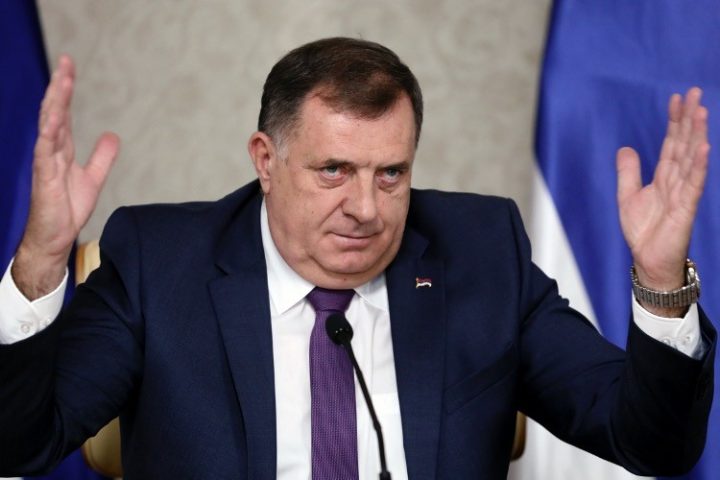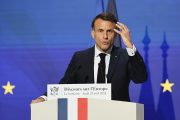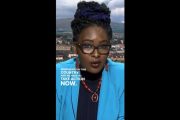
The Biden White House this week slapped sanctions on Bosnian Serb leader Milorad Dodik for his allegedly “destabilizing corrupt activities” in the wake of his push for the Serbian portion of his country, Bosnia and Herzegovina, to become independent.
The U.S. Treasury Department alleged that Dodik undermined a 1995 peace accord and is guilty of corruption and bribery. It also targeted Alternativna Televizija, a media platform Biden’s government said is under the control of Dodik.
“Milorad Dodik’s destabilizing corrupt activities and attempts to dismantle the Dayton Peace Accords, motivated by his own self-interest, threaten the stability of Bosnia and Herzegovina and the entire region,” said Brian Nelson, the Treasury Department’s under secretary for terrorism and financial intelligence.
“The United States will not hesitate to act against those who pursue corruption, destabilization, and division at the expense of their own people, as well as against those who enable and facilitate this behavior,” Nelson added.
The international establishment argues that Dodik’s actions could lead to war in the Balkan nation.
Dodik is the Serb member of Bosnia and Herzegovina’s tripartite presidency. In keeping with his desire for an independent Serb nation (rather than sharing the county with Bozniaks and Croats) he has threatened to withdraw from Bosnia’s army and form his own Serb army.
The Hill notes:
The Treasury Department slapped sanctions on Dodik in January 2017, accusing him of “actively obstructing” the 1995 Dayton Peace Accords. Officials said that the new action would build on the previous sanctions.
In the new announcement, Treasury alleged that Alternativna Televizija is owned by a company linked to Dodik’s family but that Dodik exerts control over the media outlet behind the scenes, including by requiring approval for politically sensitive stories and using it to advance his image and tarnish other political figures.
Treasury also said that Dodik has funneled money to the media company for corrupt purposes and awarded contracts to members of his family.
Also on Wednesday, the State Department similarly targeted Milan Tegeltija, the former head of Bosnia’s High Judicial and Prosecutorial Council (and an advisor to Dodik), along with Mirsad Kukic, a lawmaker and leader of the conservative political party Movement for Democratic Action—both on grounds of “significant corruption.”
Bosnia and Herzegovina is demographically composed of three main ethnic groups: Bosniaks, Croats, and Serbs. The country has a relatively weak fellow government and is divided into two regions: The Federation of Bosnia and Herzegovina (70 percent Bosniak, compared to 22 percent Croat and 2.5 percent Serb) and the Republika Srpska (“Republic of Serbia”), which has an overwhelming 81-percent Serb majority to 14 percent Bosniaks and 2.4 percent Croats.
Last month, the legislature of Republika Srpska (RS) voted to begin work on withdrawing the region away from BiH’s tax system, judiciary, and army.
The action drew sharp rebukes from the United States, the European Union, the U.K., Germany, France, Italy, and Turkey — who accused Bosnian Serbs of threatening the stability of the Balkan region and putting the country on a path to war. Dodik has said he rejects war and wants to pursue independence by merely political means.
The Bosnian War, which claimed approximately 100,000 lives, took place from 1992 to 1995 after the breakup of the preceding state of Yugoslavia. It was fought between Serbs on one side and Bosniaks and Croats on the other.
Ethnic and religious differences between Bosnia and Herzegovina’s three demographics are a source of tension. Most Bosniaks are Muslim, while Serbs are predominantly Orthodox Christians and Croats are mostly Catholic.
Dodik invokes the right of Bosnian Serbs to self-determination. In 2008, he stated that Muslim judges should not be allowed to preside over cases in Republika Srpska. In November of this year, speaking in support of further Serb withdrawal from the national armed forces, Dodik said, “We will not allow the Armed Forces to become a Muslim army.”
The sanctions placed on Dodik mean he is blocked from traveling to the United States.
The western powers, from the Untied States to the E.U., have made clear that they will not tolerate a separatist movement in Bosnia and Herzegovina.
Are the international Powers that Be truly interested in preventing war in the Balkans? Or are they offended because the possibility of Serb people’s independence challenges their globalist goal of world government?




